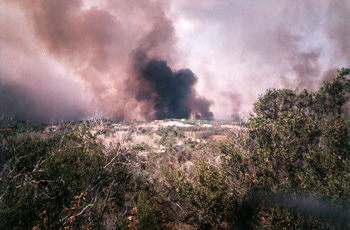Since Johnathan posted a picture of the Captin’s Market last week, I thought I may as well post a picture of my favorite corner gas-station and mini-mart. The exterior is … deceptive. The inside of it is very different from what you would expect, just driving past.

Americas
Regarding The Obamacare Decision
I didn’t mean to post on that particular issue today, but as I was running through the Daily Brief archives looking for something else entirely, I found this entry from nearly a year ago – which is rendered timeless by today’s events. That’s the trouble with having a huge blog-archive, by the way – one is always finding quite splendid entries that one has forgotten entirely.
(A comment by Xennedy at this thread on Belmont Club which struck me as being particularly perceptive — and histoically apt.)
I’m not thinking of military history for this one. I’m thinking of the various schemes by which the southern states retained political dominance of the United States over the increasingly more numerous and anti-slavery northerners prior to the Civil War. Eventually these schemes became so odious and unpopular that they destroyed the political structure of the Union as it had existed. The response of the South wasn’t to accept demotion or immediate war it was to engineer a supreme court decision to end the house divided, as Abraham Lincoln put it, and make the whole union slavery friendly. I’m thinking of the Dredd Scott decision, and in my evaluation of that ruling in theory southerners could bring their slaves into (say) New York and compete with free labor unhampered by the free state status of that state. In practice the Civil War intervened before anything like that actually happened, but my point is that the political establishment of the day attempted to rule game over and cement their hold on power in perpetuity regardless of the will of the people.
Seem familiar? In my view similar events are happening today. Cram Obamacare through, hold 40 Senate seats, and it’s extremely difficult to repeal. Issue EPA regulations from the executive branch, and ignore Congress. Re-elect Obama, pick another two or three supreme court justices, and the Constitution means whatever the left wants it to mean.
The problem with this or perhaps I should say the solution is that eventually people tire of the rigged game, and lose their willingness to play.
So was Obamacare a new Kansas-Nebraska Act which preceded the formation of the modern Republican party or a new Dredd Scott decision which preceded secession and civil war? Or neither?
I don’t claim to know. But I do think we are in the opening acts of a much larger story, and the drama over the debt limit is much less important than it appears in the immediacy of the here and now. The welfare state paradigm of American governance is collapsing, and that collapse will continue even if a debt ceiling increase gives it a slightly longer run. To quote that famous Chinese curse we live in interesting times. Alas.
I’ve long been a fan of Wretchard, at Belmont Club – and of Steven den Beste, too, when he was regularly posting, back in the High Middle Ages of blogging. (Which was in the early Oughties, more or less). In a just world, they would have mighty thrones among those who comment upon current events. Wierd that I am the scatter-brained, intuitive humanities major who appreciates the heck out of severely logical IT-engineer types, but there you go. I guess it’s because of the underlying logic about it all.
Fire Country
(This is a picture that my father took of the 2003 Paradise Mountain fire coming towards their house – the puff of black smoke is probably from a burning structure, maybe a vehicle. The rest of the pictures on that roll of film were of the house interior – to document for the insurance company.)
Reading the news about the fires burning near Colorado Springs revive memories of what it was like, when I was growing up in the hill country the hill country of Southern California. Then it would be hot and dry all summer long, the green grass of spring would turn gold, the chaparral the native brush would dry out . . . and then . . .
So Far From God
Poor Mexico, runs the saying usually attributed to long-time Mexican strongman Porfirio Diaz, So far from God, so close to the United States. I was thinking of this, when we went to see the movie For Greater Glory mostly because I had seen brief mention of it here and there on the libertarian-conservative side of the blogosphere, and the whole premise of it interested me, mostly because I had never heard of such a thing as the Cristero War. Never heard of it, and it happened in the lifetime of my grandparents, in the country right next door … and heck, in California we studied Mexico in the sixth grade. It appeared from casual conversation with the dozen or so people who caught the early matinee at a movie multiplex in San Antonio, only one of them had ever heard of it, either. Was there some cosmic cover-up, or did we have troubles enough of our own at the time … or was it just that Mexico was so constantly in turmoil that one more horrific civil struggle just blended seamlessly into the one before and the one after?
Roger Williams & the Ship of State
Roger Williams, who represents America on the oversized Reformation Wall in Geneva, was not an easy man. Graduating from Cambridge in 1627, he was chaplain to Sir William Masham; by 1630 Archbishop Laud’s demand for oaths of loyalty reached even such clerics, and so Williams and his bride set off for New England. Fortuitously, John Wilson was just then returning to England to gather his family; that is, fortuitously for anyone but Williams. He declined the First Church of Boston post, for he “durst not officiate to an unseparated people.” In the cold winter of 1634-35, he was exiled from Salem, having already been sent from Massachusetts Bay and Plymouth. “Soul liberty” became the governing core of his Providence government – one he defended against Indian attack and the ambitions of other colonies, one he buttressed with authority from England, under both Cromwell and Charles II. He understood liberty because of his “separateness.”
At times he seems an early libertarian: he took Calvinism farther than even these steely New Englanders, having sacrificed much for their faith, were willing to go. If “moderation,” as Cotton Mather noted, characterized every page of Winthrop’s biography, “extremism” would of Williams’.
